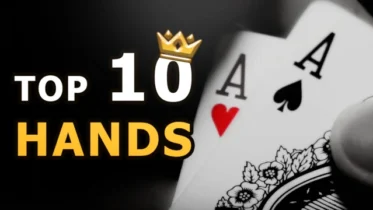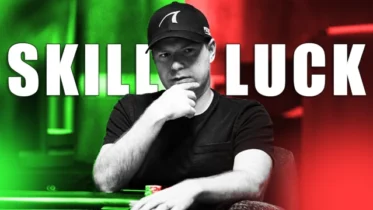One of the best study strategies you can utilize when working on your poker play is finding a specific area of your game to improve. Looking to improve your small blind play? Track down a book that dives extensively into small blind strategy. Need to get better at the math of the game? Utilize a solver and take that specific area to the next level. During a session, if you’re lucky, you will be dealt pocket jacks a few times throughout your time at the table. While certainly a strong hand, being able to play them effectively requires specific, attentive focus and study, with today’s article being a great resource.
Jacks Are A Mediocre Pair
Start with establishing a proper “framing” when considering your pocket jack strategy. If you hate playing pocket jacks it is likely due to you overvaluing them, a result of failing to acknowledge their mediocre nature. A pair of jacks is never something to bet the farm on, but sometimes they will be an overpair you can cash in on when facing fishy players. Pocket jacks will often not hold up throughout the hand, but that doesn’t mean they do not provide value if you know how to navigate them. By establishing a frame of mind that considers the susceptibility of getting out drawn with their value as an overpair, you have made the first step towards a sound pocket jack strategy.
Facing An UTG+1 Raise With Pocket Jacks In The Cutoff
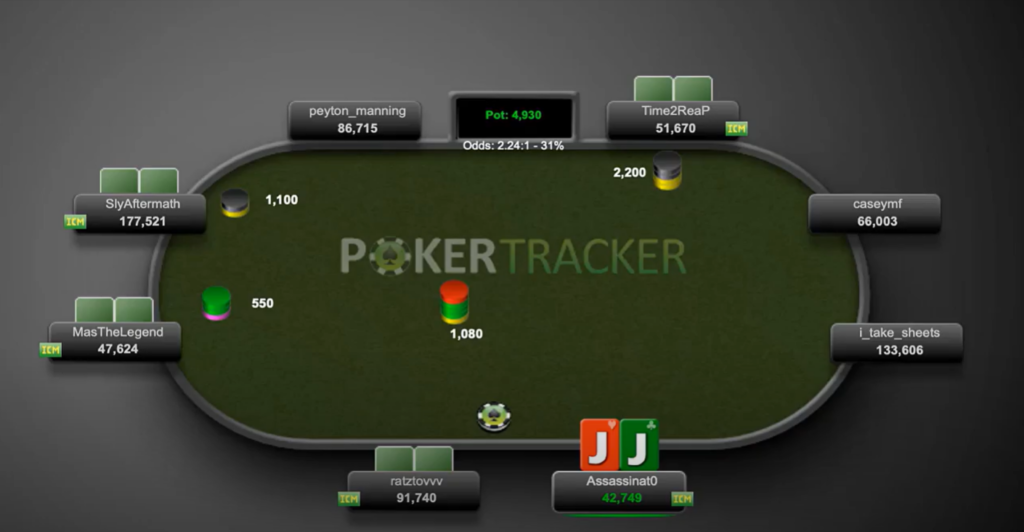
You are playing in a tournament when the under the gun (UTG) +1 player min-raises, it folds to you in the cutoff and you have pocket jacks. Obviously you are never folding, calling is the ideal move considering the early position raise of your opponent. After additional calls from the button and the big blind, the flop comes 8♥-6♠-5♣. It checks around to you with the option to check or bet. With your overpair betting is the wisest move for a half pot sizing. If your opponents in the hand are loose and prone to call, this will help add to the pot as they struggle folding potential pairs they hit on the flop.
Following your 5,215 bet, you are reraised by the button player for 14,830. While it may certainly be tough, and even frustrating, folding is the best decision in this spot. When considering a call, the most important thing to ask yourself is “if I shove, will they fold?” With the aggression shown it is not likely they would fold out whatever they are holding, by playing not just your cards but the cards of your opponent it should be considered that their hand may very well beat your jacks. Remember, while an overpair, jacks are still mediocre, and making this fold preserves your tournament life.
The Math Of Pocket Jacks
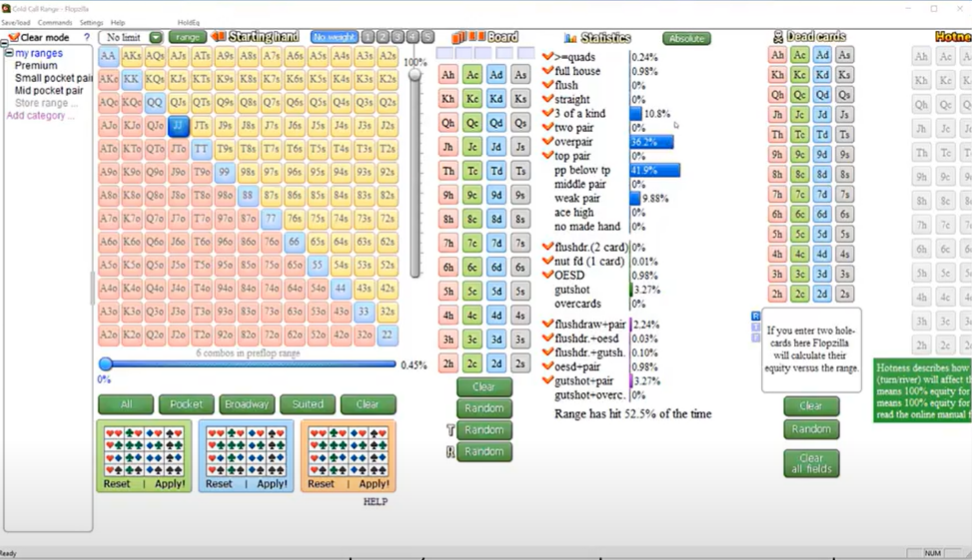
Utilizing Flopzilla we can see the frequency in which pocket jacks will get out drawn, but also how often they will hold up as an overpair. About 36% of the time pocket jacks will hold up as an over pair, while 41% of the time there will be overcards that beat jacks with top pair. While a deceptive second pair, it is still a second pair four times out of ten and a weak pair once out of every ten times, resulting in a 50-50 chance of susceptibility to being outdrawn. Understanding these percentages and frequencies provides context to how vulnerable your pocket jacks are, reinforcing the importance of the “framework” you maintain for them.
Jacks Teach You How To Play Poker
While pocket jacks certainly can serve as a mediocre pair, they do have the benefit of teaching you how to play strategically sound poker. Jacks are hard to play, meaning each time you are dealt them it forces you to think actively about how to proceed. Taking your time and assessing your opponent’s range allows you to properly value your jiggitys, instead of pumping a pot with a perceived premium hand that will ultimately turn to ruin. If you dread something it is reasonable that you will not perform to your full potential when said dreaded thing reveals itself, but by reinforcing and fully understanding a proper pocket jacks strategy you not only lose the dread but improve your overall abilities as a player. Consider the most recent times you have been dealt pocket jacks and think of what mistakes you may have made, by making a few adjustments you are on your way to not only getting value from them but additionally limiting losses.
Pay Attention To The Preflop Action
Paying attention to preflop action is critical in any hand, but even more so when you are dealt the double J’s. Preflop is your first opportunity to asses the range of your opponents, a critical component to an effective pocket jack’s strategy. Using generalized reads you can get a good grasp on how good your jacks are, if the UTG player raises and gets three-bet by another opponent prior to your action, your jacks are likely not good. Taking the perceived abilities of your opponents will also help you as you play pocket jacks, against solid, straightforward opponents you can cold call raises with weak players yet to act. When facing average opponents, three-bet your jacks wider as they will have a tendency to open too much. When playing tournaments, it is important to remember players are not sensitive to bet size, they call bigger bets just because they want to and don’t acknowledge the intricacies you know to consider. In lower stake tournaments facing weaker opposition, opponents will solely play their hand and fail to recognize what you may have, jacks or otherwise.
Want to improve your preflop range? Access your free 100 big blind chart here.
Postflop
The biggest mistake you can make when taking your pocket jacks from preflop to postflop is going into “autopilot” and not taking your preflop considerations onward throughout the hand. Focus, if you are doing something without having any rationale behind it you are potentially wasting a profitable hand. Ask yourself the following questions:
- Why am I betting this much?
- What hands do I want to call me?
- What am I planning to do on the next street?
- What will the stacks look like if I do this or that?
Asking yourself these questions every time may seem like a lot, but with practice the mental process will become muscle memory. On hands where you are facing a thin call, there are additional questions you must ask:
- Do they do this with weaker value hands?
- Do they do this with draws?
- How many combos are in their range?
- Do they make this bet with total bluffs?
Players at different levels and who play in-person or online with differ in their thin bet style, regardless remember that this thought process will usually result in a proper fold.
Cutoff Raise With Pocket Jacks On The Button
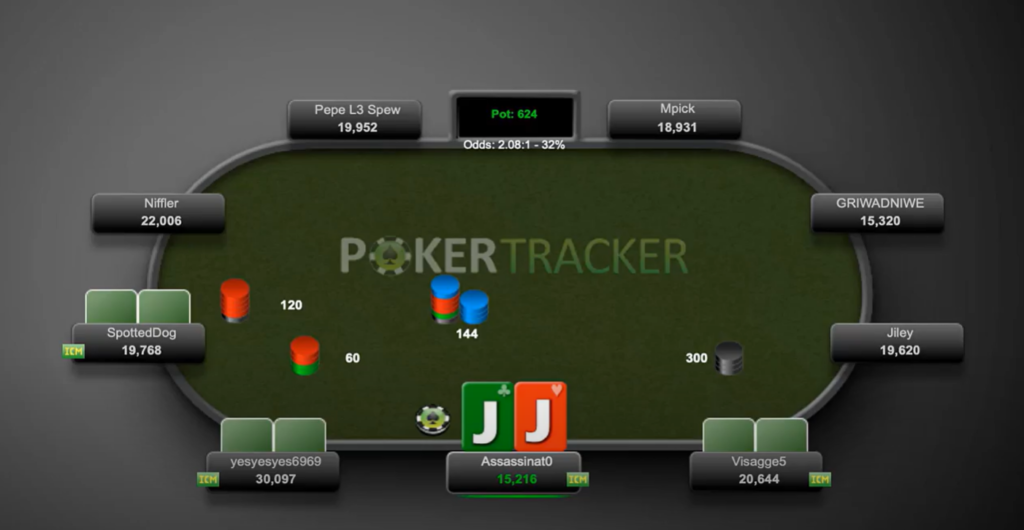
You are playing another tournament when the cutoff is the first to act raising to 300. You have pocket jacks but this time on the button. As with the previous scenario, folding is certainly not an option, but now you have the added benefit of position even with players yet to act. Utilizing the button, raising here is the premium move. After three-betting for 762 only the cutoff player calls.
The flop comes K♦-10♠-5♠ and your opponent checks, what is going through your mind right now? It should be what bet sizing are you going to use, preferably a small sizing. If you see the king on the board and immediately panic you are not maintaining the right mindset to be profitable. Players worry about being exploited and their big hands going down in flames, but if you check back they will know you do not have a king and you have essentially capped your range. Betting here, regardless of the size being small, suggests you have a king or even a strong draw. You make the optimal play and bet 462 and your opponent calls.
The turn is the 2♥ and your opponent checks, leaving you with an opportunity to continue with aggression. Betting out for half pot, you induce a fold from your opponent. Betting with these small sizes when the board reflects your range allows you to apply aggression and induce these folds without risking too much of your chips to check-raises. By setting yourself up with your flop bet, your turn bet was even more effective and gave you value for your jacks.
Jacks Will Reveal If You’re A Mature Poker Player
A popular saying in the world of athletics is “sports don’t build character, they reveal it” and the same can be said in regards to your pocket jacks play and your maturity as a poker player. At any table, it is you against eight other players, with those odds you must come to terms with the fact the eight of them collectively will win more hands than you alone. There will be 10 hour sessions where you don’t get to play a single hand, a result of the dynamics of the game. Remember: just because a hand is good preflop doesn’t mean five additional cards can’t change that. You must maintain discipline, if you let yourself act irrationally out of boredom or frustration you will waste money in cash games and sacrifice your tournament life in poker tournaments. You can only control what you can control, and that is most of poker.
Live For The Kill
You cannot will a knockout hand into existence when playing poker, you must wait for it to come to you. Players force things constantly in the poker room, pocket jacks being one of the most overplayed hands you’ll see. Visualize future streets and if they manifest, think how you can leverage them into making opponents commit to terrible calls. When you have a number of value targets, fire. Don’t worry about getting bluffed, as that won’t make you profitable in the long term. The profitable poker player is the rare human being who can accept when they’re beat and press their advantage to an absurd degree when they are winning. Some people are gamblers while others are risk adverse, those who are the ladder will struggle if they cannot get comfortable making aggressive moves when strategically sound. You must realize the true standing of pocket jacks, remember the math behind them, utilize your patience, and live for the kill.
Did you enjoy this article? Watch the companion video hosted by our very own Alex “Assassinato” Fitzgerald here.

